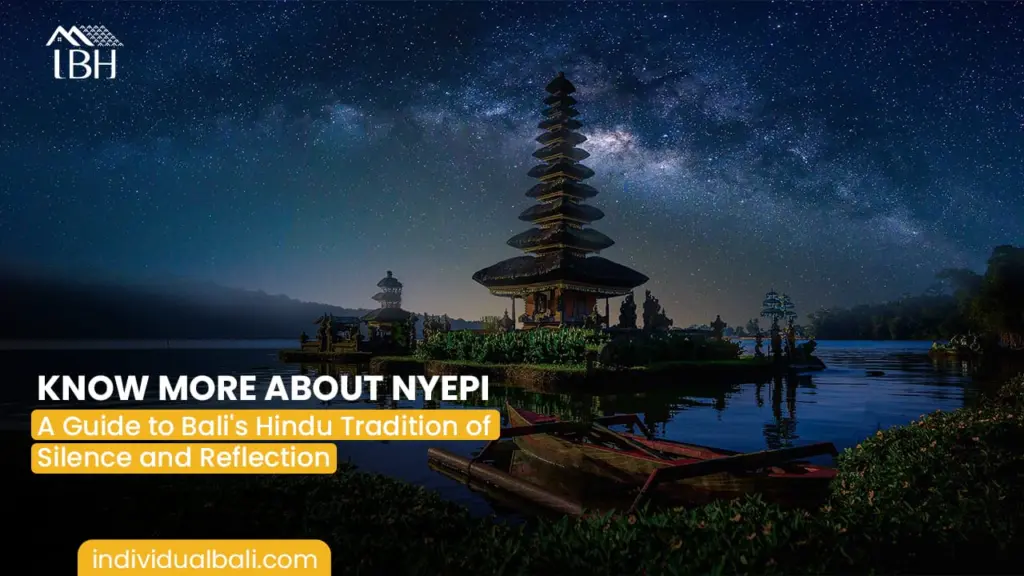Individualbali.com – There are 2 sequences of Nyepi in Bali. On the day before Nyepi, we perform a Pengrupukan to cleanse bad spirits from our compounds. Meanwhile, on the day of Nyepi, Balinese focus on Catur Brata Penyepian.
Pengrupukan: Bali’s Vibrant Prelude to Nyepi
Pengrupukan, the spirited eve preceding Nyepi, the sacred Day of Silence in Bali, heralds a kaleidoscope of vibrant traditions and fervent preparations. As twilight descends, communities across the island immerse themselves in a flurry of rituals and festivities, setting the stage for a day of introspection and renewal.
In the days leading up to Pengrupukan, anticipation fills the air as households engage in thorough cleansing rituals, purging negativity and welcoming the arrival of a new beginning. Streets bustle with activity as locals weave intricate “ogoh-ogoh” effigies, towering symbols of malevolent spirits and worldly vices, crafted with meticulous detail and artistic flair.
As night falls on Pengrupukan, the atmosphere crackles with energy as torch-lit processions wind their way through villages and towns. Bedecked in traditional attire, Balinese locals carry the menacing ogoh-ogoh through the streets, accompanied by rhythmic chants and the pulsating beat of gamelan music.
Amidst the fervor, the air resonates with a palpable sense of catharsis, as the community unites to exorcise negativity and purify the island’s spiritual landscape. Spectators line the streets, captivated by the spectacle unfolding before them, as the menacing figures are paraded through the thoroughfares, symbolizing the triumph of good over evil.
As midnight approaches, the culmination of Pengrupukan draws near, marked by a cacophony of noise and commotion. Locals unleash a barrage of cacophonous sounds, from clanging pots and pans to explosive firecrackers, driving away malevolent forces and ushering in a dawn of purity and serenity.
Pengrupukan serves as a vibrant prelude to Nyepi, offering a dynamic contrast to the tranquility that follows. It encapsulates the essence of Balinese spirituality, blending reverence with exuberance, and forging connections that transcend time and tradition. In this moment of collective celebration, the spirit of Bali shines brightly, illuminating the path towards inner peace and renewal.
Nyepi the Silent Day
Nyepi Day, an important religious celebration in Bali also known as the Balinese New Year. During Nyepi, the entire island comes to a halt as people refrain from any activities, turn off lights and sounds, and follow the four precepts of Catur Brata. Nyepi is a day of self-reflection, meditation, and silence. Even tourists and non-Hindus are expected to follow the rules and restrictions, including staying indoors and avoiding any form of entertainment or activities. Bright lights or fires are not allowed, but low lighting inside hotel rooms is permitted.
Catur Brata Penyepian (Four Nyepi Restrictions): These four principles guide the observance of Nyepi and emphasize self-discipline, introspection, and spiritual cleansing:
- Amati Geni (No Fire): At sunrise, all fires and lights are extinguished as part of Amati Geni, symbolizing self-control and restraint.
- Amati Karya (No Work): Balinese Hindus refrain from engaging in any form of physical activity, work, or entertainment throughout the day, reflecting on the importance of inner reflection and spiritual introspection.
- Amati Lelanguan (No Leisure): Leisure activities such as eating, entertainment, and travel are suspended, encouraging individuals to focus on spiritual pursuits and meditation.
- Amati Lelungan (No Travel): Movement outside the home is restricted, with roads and streets empty, allowing for a profound sense of peace and quiet to envelop the island.
Nyepi falls on the first day of the tenth month in the lunar calendar, which usually falls in March or April in the Gregorian calendar. During Nyepi, all forms of transportation are halted, and the Ngurah Rai International Airport and other transport hubs in Bali are closed. While Nyepi may seem restrictive, it is a vital part of Balinese culture and a unique experience for visitors to immerse themselves in the island’s traditions and spirituality.
Do’s and Don’ts
To ensure a peaceful and respectful Nyepi celebration in Bali, it is essential to follow certain do’s and don’ts:
- Do stay inside your hotel accommodation and take advantage of indoor activities available during the Day of Silence.
- Do book your plane ticket before or after Nyepi, as there are no flights landing or taking off during the 24-hour period.
- Do keep your voice and electronic devices at a minimum. If you need to use your phone or other gadgets, use headphones.
- Do prepare all necessary supplies before Nyepi starts, including food and medicine.
- Do call for hotel assistance in case of emergency, as public transportation will not be available.
- Don’t attempt to leave your hotel or accommodation during Nyepi, as the local watchmen will stop anyone from doing so.
- Don’t schedule any important appointments or events on the day of Nyepi.
- Don’t make any loud noise or commotion, as this goes against the spirit of the day.
- Don’t try to purchase any supplies or daily necessities, as all shops and markets will be closed.
- Don’t attempt to go to the hospital by yourself if you are sick, as public transportation will not be available. Call for hotel assistance or an ambulance if needed.
During the Nyepi Day, the island goes into a complete shutdown with no lights, no noise, and no activities as a sign of self-reflection and purification. Many people from all over the world flock to Bali to experience this special occasion at least once in their lifetime. One of the most captivating moments during Nyepi Day is witnessing the clear and starry sky without any light pollution.
If you wish to experience Nyepi, the silent day in Bali, with your partner, family, and friends, we offer various packages tailored to your preferences. Contact our team at Individual Bali Hospitality, and we will craft a holiday experience that you’ll cherish forever.












